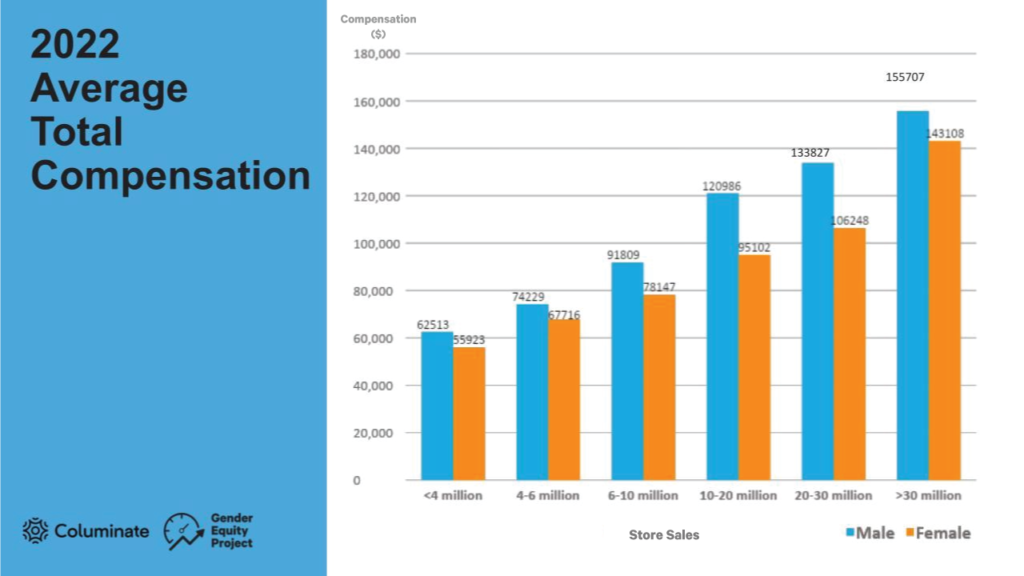In February 2021, Columinate launched its Gender Equity Project in response to findings that grocery co-op general managers (GMs) who identify as female are paid significantly less than their male counterparts.
This project seeks to bring awareness to the gender compensation disparity among food co-op GMs and to provide support to organizations willing to address their structural inequities.
We talked with project lead and Columinate consultant Carolee Colter to learn how the Gender Equity Project is going, one year after its inception.
HOW DID THE GENDER EQUITY PROJECT GET STARTED?

Carolee Colter, Columinate Consultant
The Gender Equity Project has roots over ten years in the past, in the development of what was formerly the Co-op General Manager Compensation Database and is now the Columinate Compensation Database. This resource was created in 2009 to facilitate the anonymous sharing of compensation information among general managers. Prior to this, GMs lacked a quick and convenient way to understand how their pay compared to their peers at comparable stores.
“General managers were calling up other general managers to ask them about their compensation, so that they could do their own bench marking of their pay against their peers. It was tremendously time-consuming for them,” says Colter.
With the database, general managers for the first time could select their own peer group and see how their salary compared.
At its inception, the database was hosted by CoMetrics and administered by Colter as part of Columinate. As compensation data was gathered and updated over the years, a concerning trend emerged: the total compensation of female GMs averaged lower than that of their male counterparts, in every range of store sales volume. “In 2011,” explains Colter, “the male-identifying and female-identifying GMs’ compensation was pretty much at parity. By 2016, male-identifying GMs were definitely pulling ahead [in compensation], and by 2021 it was much more so.”
This data confirmed longstanding suspicions that despite their commitment to progressive social values, grocery co-ops were falling behind when it came to gender pay equity.
WHAT TRENDS ARE WE SEEING?
At the start of 2021, the Columinate Compensation Database showed that “at every size of co-op from the smallest to the largest, female GMs earn $10,000 to $25,000 less per year than their male peers in similarly sized co-ops.” Many attempted explanations for the disparity did not hold. Even with factors such as their length of service and their cost of living being equal, male GMs make more than female GMs across the board.
Similar disparities persist today. The graph below shows the average total compensation of food co-op GMs in 2022 broken down by gender. Represented by orange, female-identifying GMs are still earning less than their male counterparts.

In order to continue collecting and analyzing data with an eye toward gender parity in co-op compensation, the Gender Equity Project was established. This occurred at the same time that Columinate took over the hosting of the database and updated its design in 2021.
WHAT IMPACT HAS THE GENDER EQUITY PROJECT HAD SO FAR?
While these concerning findings have been shared with participating co-op boards and general managers, it’s really too soon to say if spotlighting the disparity has caused it to change. But in some individual cases, Colter thinks it has.
“After sharing our findings, I noticed some individual cases where female GMs received significant raises. This has started to bring them closer to parity with their male peers.”
One of the female general managers, who wishes to remain anonymous, received a significant pay raise thanks to Columinate’s findings on pay inequity. “I was having lunch with a few other female GMs, and the topic of compensation came up. This was the first time we had seen the [Columinate] data showing just how big of a pay disparity there was between us and our male counterparts. We all wanted to address it, but we all felt a little uncomfortable asking for more money. We challenged each other to address the issue in our own stores, and that made it feel like I was part of creating a bigger change, something not just for myself, which was why I was holding back all those years.”
She attended a Columinate webinar on this pay disparity with her board, after which they were ready for a change. “They were totally supportive. They did not want to be part of the problem. And, I realized that by feeling a little uncomfortable, I had been standing in my own way.”
Armed with the data, she felt much more confident in proposing a change. “I needed to feel like [the board] wasn’t going to laugh at me when I made a proposal.”
Ultimately, she got her salary adjusted by nearly $15,000 dollars. “If I didn’t work to make a change in my co-op, I was doing a disservice to all the other female GMs.”
In addition to moving some co-op boards and general managers to action, the Gender Equity Project has highlighted the need for better information to measure progress towards a more equitable workplace. Specifically, the Columinate Compensation Database is being updated with new tags to begin tracking important information on race and gender identity. This data will be critical in addressing societal biases and inequities that are reflected in our co-ops. (Read more about racial biases in co-op grocery stores and what you can do here.)
I CARE ABOUT THIS ISSUE. WHAT CAN I DO TO START ADDRESSING PAY EQUITY IN MY ORGANIZATION?
-
As a Board, reflect on your own co-op’s data. If your GM is a woman, ask yourself: Are we paying her at parity? The Columinate Compensation Database can be used to pull a report to see how her pay compares to her peers.
-
Read up on The Gender Equity Project. Learn more about the project by reading our collection of library articles. Or, watch Carolee Colter’s webinar on addressing gender pay disparity.
-
Make sure your data counts. If you’re a general manager, sign up for the Columinate Compensation Database. If you’re a board member, make sure your general manager is contributing to the database at https://compensation.columinate.coop/.
Have more questions?
Get in touch with one of our consultants.
